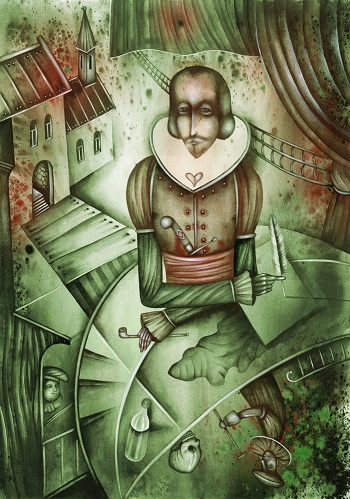

Este trabalho está licenciado sob uma licença Creative Commons Attribution-NonCommercial 4.0 International License.
Aquellos autores/as que tengan publicaciones con esta revista, aceptan los términos siguientes:
- Los autores/as conservarán sus derechos de autor y garantizarán a la revista el derecho de primera publicación de su obra, el cuál estará simultáneamente sujeto a la Licencia de reconocimiento no comercial de Creative Commons que permite a terceros compartir la obra siempre que se indique su autor y su primera publicación esta revista.
- Los autores/as podrán adoptar otros acuerdos de licencia no exclusiva de distribución de la versión de la obra publicada (p. ej.: depositarla en un archivo telemático institucional o publicarla en un volumen monográfico) siempre que se indique la publicación inicial en esta revista.
- Se permite y recomienda a los autores/as difundir su obra a través de Internet (p. ej.: en archivos telemáticos institucionales o en su página web) antes y durante el proceso de envío, lo cual puede producir intercambios interesantes y aumentar las citas de la obra publicada. (Véase El efecto del acceso abierto).
Resumo
Traditional jurisprudence, with its roots in the seventeenth century, has been preoccupied with questions of legal legitimacy and the composition of law. In Shakespeare's history plays, one finds a parallel legal discourse. Shakespeare does not seem persuaded by ideas of a perfect legal order as much as he does by the problematics of law itself. This essay examines two of Shakespeare's history plays: Richard II[1]and Henry V.[2]These plays are positioned at both extremes of what scholars call the second tetralogy?. Their narratives are also couched in contrasting terms: the first is built on the image of a beleaguered monarchy, while the second, as it appears, on a more powerful and united polity. Taken together, the range offered by these texts lay ample ground to investigate the positions and promptings of a legal order.
This essay's main argument is that Shakespeare attempts to counter the view that the law is a relatively stable set of principles that can be seen persisting indifferently through turbulent and peaceful times. The argument is developed through three thematic sections. The first section, with two subsections, explores the meaning and implications of justice. Friedrich Nietzsche's aetiological descriptions of justice are applied to the action of both plays. It is argued that justice is an inherently fractured concept, lending it self to divisive tendencies far more than it does to order and unity. The law's supposed orientation towards justice, it follows, perils it with the same attributes. The second section, also divided into two subsections, looks at history, ceremony and power and demonstrates how these themes are used in the plays to complicate the image of law as a predictable, stable and unifying device. The third section examines entrenched legal or constitutional principles, on the one hand, and popular politics, on the other, and demonstrates how their interaction reflects the inherent instability of a legal order. The final section concludes.
The observations in this essay are rooted in the plays texts. Therefore, while conclusions about broad themes like law or justice are stated in general terms, it would be helpful to view them in light of both plays and their specific narratives, before they are considered as broad inferences.
[1]William Shakespeare, King Richard II (C. R. Forker ed., Arden 3) (2002).
[2]William Shakespeare, King Henry V (T. W. Craik ed., Arden 3) (1995).

Referências
Barthes, Roland. Image Music Text. London: Fontana Press, 1987.
Berger, Henry. Psychoanalysing the Shakespeare Text, in Emma Smith, ed. Shakespeare's Histories, 103-123. Oxford: Blackwell Publishing, 2004.
Chernaik, Warren. The Cambridge Introduction to Shakespeare's History Plays. Cambridge: Cambridge University Press, 2007.
Dollimore, Jonathan, and Alan Sinfield. History and Ideology, in Alternative Shakespeares, ed. John Drakakis, 209-230. New York: Routledge, 2002.
Greenblatt, Stephen. Invisible Bullets: Renaissance Authority and Subversion in Henry VI and Henry V, in Jonathan Dollimore and Alan Sinfield, eds. Political Shakespeare: New Essays in Cultural Materialism Manchester: Manchester University Press, 1985.
Hart, H. L. A. The Concept of Law. Oxford: Oxford University Press, 1961.
Heinze, Eric. Heir, Celebrity, Martyr, Monster: Legal and Political Legitimacy in Shakespeare and Beyond. Law and Critique 20, No. 1 (2009).
Heinze, Eric. The Concept of Injustice. New York: Routledge, 2014.
Holderness, Graham. Shakespeare: The Histories. New York: St. Martin's Press, 2000.
Hooker, Richard. Of the Laws of Ecclesiastical Polity. Cambridge: Cambridge University Press, 1989.
Leggatt, Alexander. Shakespeare's Political Drama. The History Plays and the Roman Plays. New York: Routledge, 1988.
Lord Sumption, The Historian as Judge, The Supreme Court of the United Kingdom. Available from: https://www.supremecourt.uk/docs/speech-161006.pdf (Accessed March 29, 2018).
Machiavelli, Nicollò. The Prince. T. Parks, trans. London: Penguin Classics, 2009.
Maus, Katharine Eisamen. Introductory Remarks to Richard the Second, in Stephen Greenblatt, ed. The Norton Shakespeare. 3rd ed. New York: W. W. Norton and Company, 2015.
Nietzsche, Friedrich. On the Genealogy of Morality, ed. K. Ansell-Pearson. Cambridge: Cambridge University Press, 2011.
Pan, Wei. Towards a Consultative Rule of Law Regime in China, in Zhao S, ed. Debating political reform in China, 3-20. New York: Armonk, 2006.
Rackin, Phyllis. Stages of History: Shakespeare's English Chronicles. Ithaca: Cornell University Press, 1990.
Ward, Ian. Shakespeare and the Legal Imagination. London: Butterworths, 1999.
William Shakespeare, King Henry V. T. W. Craik, ed. The Arden Shakespeare: The Third Series, 1995.
William Shakespeare, King Richard II. Charles R. Forker, ed. The Arden Shakespeare: The Third Series, 2002.

















